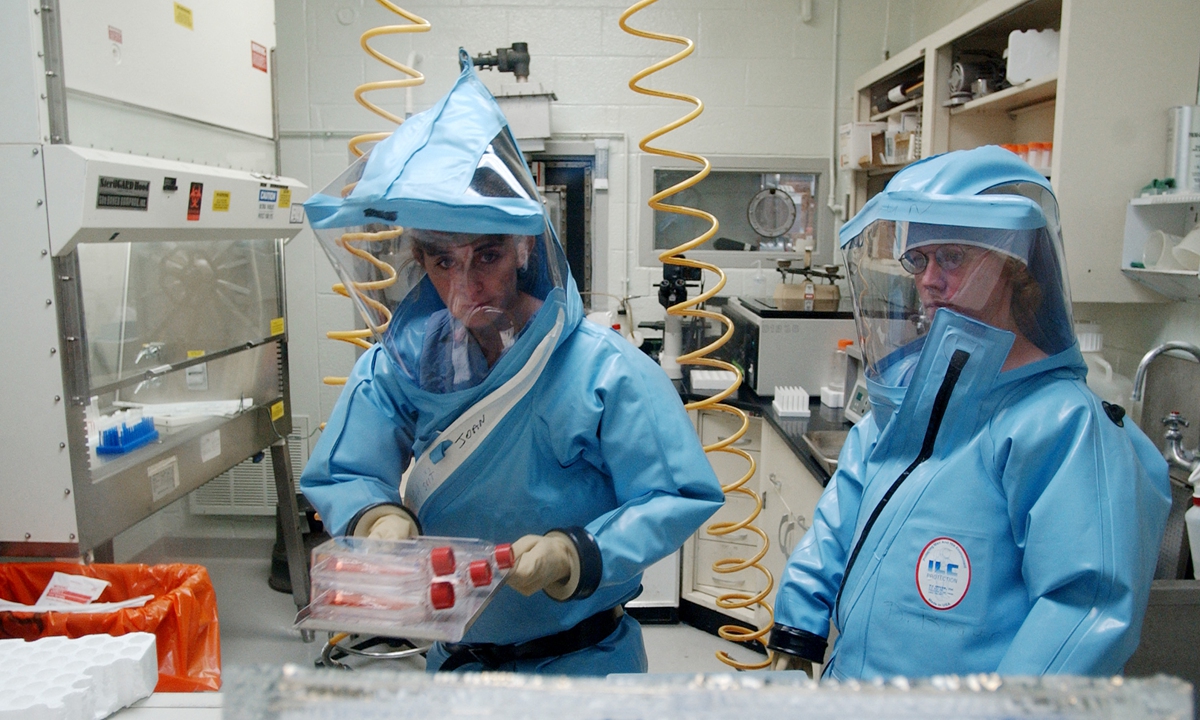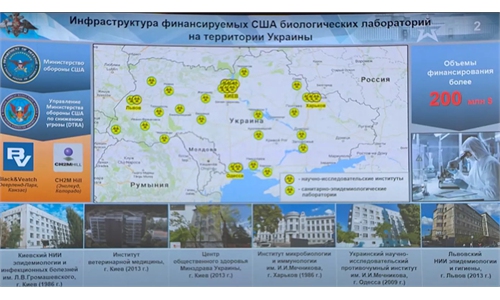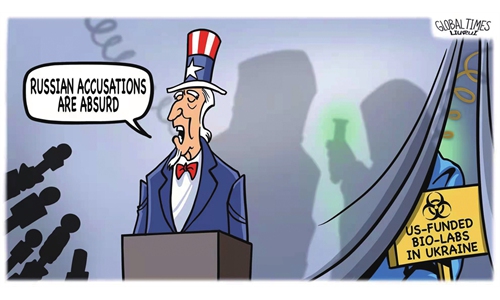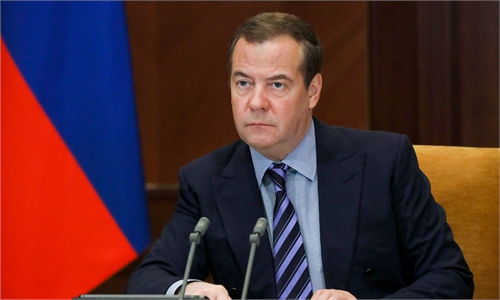
Personnel are working inside a bio-lab at the US Army Medical Research Institute of Infectious Diseases at Fort Detrick on September 26, 2002. Photo: AFP
When Marvel created Thanos, it might have had Uncle Sam in mind. The two share unrivalled power in each universe, have their own share of clashes with others and always think of their actions as justified. But Uncle Sam goes one step further. Apart from visible weapons, it has also been studying how microbes and viruses could be used to its advantage in its biological labs at home and abroad.The US submitted to the Biological Weapons Convention meeting that it has controlled more than 336 biological labs in 30 countries worldwide. What is left unsaid is worth more attention. For one, as the 5,629 contracts signed between the bio-labs outside the US and the Defense Threat Reduction Agency have shown, the US has actually deployed bio-labs in 49 countries and regions, according to an arms control expert. For another, the agency is affiliated with the Pentagon, as many US biological and medical research institutions are. Scattered across the world, these secretive facilities would prop up the US Empire in peacetime and become outposts for preemption in case of biological warfare.
Not told by the Western propaganda machine is how dangerous these bio-labs are, especially to the host countries, which are mainly developing countries. In Thailand, the Armed Forces Research Institute of Medical Sciences is among the largest Pentagon-controlled labs abroad for medical research, where a large amount of high-risk viruses, germ and parasite samples are stored. In South Korea, live anthrax samples were sent from Utah as a regular delivery package in 2015. The subsequent exposure of the JUPITR program and protests for years failed to stop the US from shipping biochemical samples to Asian countries.
Contagious diseases have broken out in places that "happen to" host biological research programs run by the US, particularly by private firms with Pentagon contracts. In 2017, Afghanistan registered 237 cases of Crimean-Congo Hemorrhagic Fever (CCHF), 41 of which were fatal. In fact, three years earlier in Georgia, 34 people contracted CCHF and three died. According to documents released by Georgia's former Minister of State Security Igor Giorgadze, 73 volunteers that participated in tests at Georgia's Lugar Center died between 2015 and 2016. A simple fact makes all these pieces fall into the place: The research programs in both Afghanistan and Georgia as well as the Lugar Center were operated by the same Pentagon contractor Battelle.
If storing samples in other countries is like getting the genie out of the bottle, then contracting overseas bio-labs to private companies means placing a ticking bomb in the host country. It seems perfectly economic for the US to transfer the high research and administrative costs, as well as accountability and public criticism to the host country, as hundreds of health-related accidents have reportedly occurred at home where 13 operational or planned BSL-4 labs and 1,495 BSL-3 labs are based by 2013.
The private firm Battelle Memorial Institute, mentioned above, is an old pal of the Pentagon. According to public documents, Battelle worked on the US biological weapons program under 11 contracts with the US Army from 1952 to 1966. It also worked with the CIA in a joint investigation dubbed Project Clear Vision between 1997 and 2000, which was tasked to reconstruct and test Soviet-era anthrax bomblet. However, the project was not disclosed in the Biological Weapons Convention declarations the US submitted to the UN. Such evasion is reminiscent of Fort Detrick, where Battelle has operated a top-secret bio-lab of the National Bio-defense Analysis and Countermeasures Center warranted by the Department of Homeland Security.
Why would the US invest so much and so broadly in boxing an imagined phantom? Perhaps it is the audacity of a non-state party to the Rome Statute of the International Criminal Court that defines biological experiments as war crimes. It may be the economic interests connecting the military-industrial complex, the Pentagon and Wall Street. Or it is America's old habit as a hegemon to "act first and ask later" for consent. After all, the US government covertly conducted open-air tests by spreading Serratia marcescens bacteria at US airports and subways through the 1960s. And the American public did not learn of the assaults of offensive biological weapons until eight years after President Richard Nixon terminated the program.
There are plenty of reasons why host countries of US bio-labs should stay on high alert. The US should play it smartly too. When it shakes hands harboring germs and bacteria with others, it infects its partners without shielding itself from risks. "Keep your hands clean." The US can surely get this amid the COVID-19 pandemic.
The author is a commentator on international affairs, writing regularly for the Global Times, China Daily, and so on. He can be reached at xinping604@gmail.com



